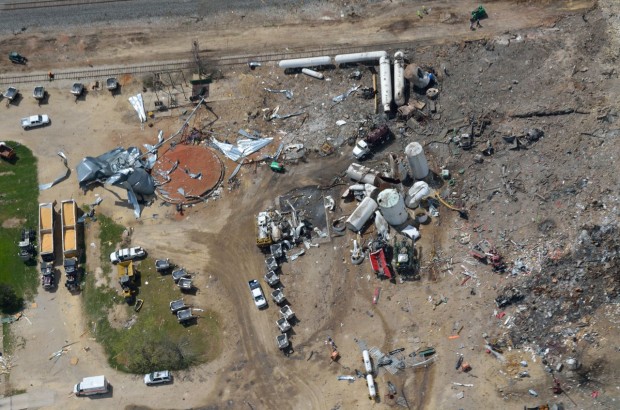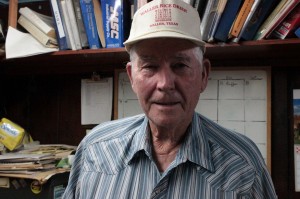Dangerous Ammonium Nitrate Fertilizer Losing Favor In Texas

4/22/2013.Photo credit: Shane.torgerson/Wikipedia
Aerial photo of the West explosion site taken several days after blast.
In Texas, some of the most deadly explosions have been caused by a substance that otherwise plays a vital role in how we grow crops: ammonium nitrate fertilizer. It’s what blew-up in the small city of West two years ago, killing 14 people. But the use of the popular chemical has suddenly dropped significantly.
Maybe you garden and know all about fertilizer. But if not, you need to know that fertilizer can be from a multitude of mixes of different chemicals.
But the one fertilizer that has caused catastrophes in the past is a product made of just one chemical: ammonium nitrate. It provides plants with nitrogen so they can thrive. But when mixed with something like diesel fuel, it becomes deadly.
It’s what Timothy McVeigh used to blow up the federal building in Oklahoma City 20 years ago. And in 2013 it’s what exploded at a farm supply business in the Texas town of West.
Yet, despite those and many more deadly explosions over the years, ammonium nitrate fertilizer remained very popular with farmers and ranchers.
“So why’s it still used? It’s very useful as a fertilizer, simply,” says Jake Mowrer, a fertilizer expert at Texas A&M.
Mowrer says it works especially well to grow hay in Texas. In past years, tens of thousands of tons of it were used here every year.

KHUF
Doyle Sitton says he stopped selling ammonium nitrate fertilizer years ago
But in recent months, something began changing. The use of ammonium nitrate fertilizer in Texas has plummeted. According to state data, 73,000 tons of it were used in 2005.
Over the next few years, use dropped some but was steady until the past 12 months. That’s when the data show use suddenly falling to less than half of what had been a decade ago. Why?
We got some insight by visiting the farming and ranching community of Waller, just northwest of Houston.
It’s a busy morning at Haney Feed and Farm Supply. Doyle Sitton has run the place for nearly 60 years.
But when it comes to ammonium nitrate fertilizer, he’s been ahead of the times.
“Well yes, I used to carry it in bags,” Sitton tells us. “I made the decision not to carry it about 20 years ago … because the extra paperwork to keep up with it.”
Sitton says he stopped selling ammonium nitrate fertilizer because over the years, new regulations — prompted by terrorism and safety concerns — meant dealers like him had to account for every pound and store it securely and safety away from anything that could ignite it.
“I don’t think they’re over-doing it (with the regulations). As you get more and more kooks in this world, ha, you’ll have to watch ‘em closer,” Sitton told us.
What’s more, after the West explosion, insurance rates for dealers carrying ammonium nitrate fertilizer have gone up. So increasingly, there are more and more dealers like Sitton, dropping it from their inventories.
“I think there’s a lot of dealers that just don’t want to deal with all the paperwork,” says Donnie Dippel, a rancher in La Grange and president of the Texas Ag Industries Association.
Dippel says he can use other mixes of fertilizer chemicals that are not hazardous the way ammonium nitrate is. He says for those Texas dealers still carrying it, new state rules mean inspections are now underway to make sure storage is done safely.
Does he think Texas is safer now than it was pre-west explosion?
“Yes sir,“ says Dippel.
Could this be the beginning of the end for one of the most popular and effective fertilizers that unfortunately also has such a safety and security risk? That’s doubtful according to Jake Mowrer, the expert at Texas A&M.
“My personal prediction would be we’re not going to see an end of ammonium nitrate, there’d be too much blow back from the people who rely on it for it to be banned,” says Mowrer.